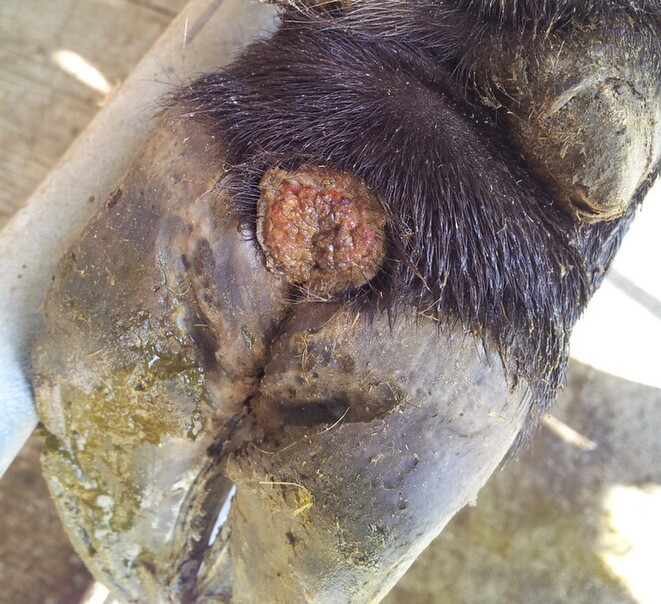Description
Digital dermatitis is a skin disease of cattle, which usually affects the skin of rear feet, midline just above the bulb of the heel.
Many herds in all provinces of New Zealand have a few cases in their herds but are unaware because the lesions in the early stages do not cause lameness. If not treated the infection gradually spreads through the herd.
Cause
Digital dermatitis is an infection caused by a mixture of different bacteria, but including Treponema.
Appearance
A typical case of digital dermatitis goes through a number of stages. The early lesion is seen as a moist, light grey brown, exuding area with matted hair at the back of the foot. Untreated it can develop to appear like a granulation/”cauliflower”. This lesion eventually may heal to look just like a small scar, but can still be infectious.
Treatment
The affected lesion must be cleaned with water and dried and an antibiotic spray applied. Let the spray dry for 10 – 15 seconds and then apply again. Lower the foot and then let the cow stand for 10 – 15 minutes on clean concrete. Bandaging large lesions for a maximum of three days will result in better healing.
Control
In infected herds, severe outbreaks can be prevented with regular hygiene in all facilities and regular foot-bathing of all stock with antiseptic solutions of formalin or copper sulphate on a regular basis.
Prevention
To keep a herd clear you should seriously consider quarantining your herd. The most likely ways BDD could enter your herd are:
1) Buying in infected cows, heifers or bulls
2) Running dry cows or heifers with other herds
3) Vets or hoof trimmers using dirty equipment
To ensure that your herd remains free of the disease you should do two things:
1) Screen your herd at least once each season (see www.lamecow.co.nz for a video on the simple method used).
2) Build a foot bath at the exit to your shed and foot bath occasionally – maybe twice a month as a precaution. (see www.lamecow.co.nz for a cheap effective footbath design).
It is really important to take this disease seriously because once the disease establishes itself in a herd it seems impossible to eradicate.
- Neil chesterton check out his website here.

